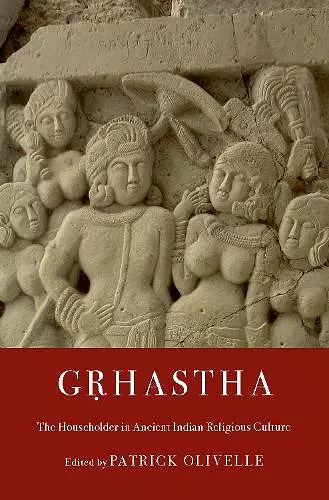Gṛhastha
The Householder in Ancient Indian Religious Culture
Format:Hardback
Publisher:Oxford University Press Inc
Published:24th Sep '19
Currently unavailable, and unfortunately no date known when it will be back

For scholars of ancient Indian religions, the wandering mendicants who left home and family for a celibate life and the search for liberation represent an enigma. The Vedic religion, centered on the married household, had no place for such a figure. Much has been written about the Indian ascetic but hardly any scholarly attention has been paid to the married householder with wife and children, generally referred to in Sanskrit as gṛhastha: "the stay-at-home." The institution of the householder is viewed implicitly as posing little historical problems with regard to its origin or meaning. This volume problematizes the figure of the householder within ancient Indian culture and religion. It shows that the term gṛhastha is a neologism and is understandable only in its opposition to the ascetic who goes away from home (pravrajita). Through a thorough and comprehensive analysis of a wide range of inscriptions and texts, ranging from the Vedas, Dharmasastras, Epics, and belle lettres to Buddhist and Jain texts and texts on governance and erotics, this volume analyses the meanings, functions, and roles of the householder from the earliest times unti about the fifth century CE. The central finding of these studies is that the householder bearing the name gṛhastha is not simply a married man with a family but someone dedicated to the same or similar goals as an ascetic while remaining at home and performing the economic and ritual duties incumbent on him. The gṛhastha is thus not a generic householder, for whom there are many other Sanskrit terms, but a religiously charged concept that is intended as a full-fledged and even superior alternative to the concept of a religious renouncer.
Patrick Olivelle has put together a collection of fine essays on a figure we thought we knew well: the gṛhastha. Clearly we did not. The scholars featured here will change the way we think. * Gregory Schopen, Distinguished Professor of Sanskrit and Buddhist Studies, UCLA *
This groundbreaking volume develops Stephanie Jamison's singular, stunning discovery -- that the gṛhastha ("stay-at-home") in his foundational context is not identifiable with the Vedic married householder, but rather a non-peripatetic religious specialist. Eleven essays following hers extend Jamison's philological study of this social institution to classical Hinduism, Jainism, and Buddhism. Simply put, Gṛhastha offers a paradigmatic model for the collaborative, scholarly examination of history through philology. * John Nemec, Associate Professor of Indian Religions and South Asian Studies, University of Virginia *
For centuries the figure who evoked India to the West has been the ascetic, the yogi, the religious loner, the person who renounced home and family. Yet through all those years it has actually been householders who set most of the tone and terms of Hindu life. This book gets at the roots of the concept "householder," and we are guided, appropriately enough, not by a lone scholar but by a team -- members of the distinguished academic family gathered around Stephanie Jamison and Patrick Olivelle. * Jack Stratton Hawley, Claire Tow Professor of Religion, Barnard College, Columbia University *
ISBN: 9780190696153
Dimensions: 163mm x 236mm x 31mm
Weight: 567g
288 pages